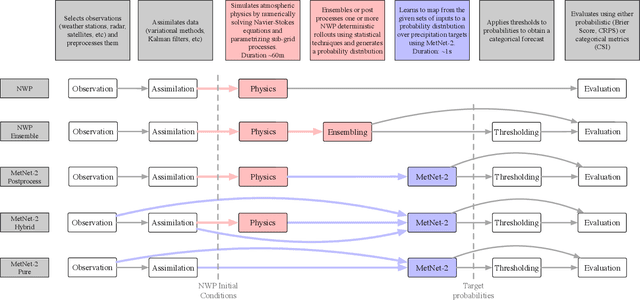Casper Sønderby
Skillful Twelve Hour Precipitation Forecasts using Large Context Neural Networks
Nov 14, 2021



Abstract:The problem of forecasting weather has been scientifically studied for centuries due to its high impact on human lives, transportation, food production and energy management, among others. Current operational forecasting models are based on physics and use supercomputers to simulate the atmosphere to make forecasts hours and days in advance. Better physics-based forecasts require improvements in the models themselves, which can be a substantial scientific challenge, as well as improvements in the underlying resolution, which can be computationally prohibitive. An emerging class of weather models based on neural networks represents a paradigm shift in weather forecasting: the models learn the required transformations from data instead of relying on hand-coded physics and are computationally efficient. For neural models, however, each additional hour of lead time poses a substantial challenge as it requires capturing ever larger spatial contexts and increases the uncertainty of the prediction. In this work, we present a neural network that is capable of large-scale precipitation forecasting up to twelve hours ahead and, starting from the same atmospheric state, the model achieves greater skill than the state-of-the-art physics-based models HRRR and HREF that currently operate in the Continental United States. Interpretability analyses reinforce the observation that the model learns to emulate advanced physics principles. These results represent a substantial step towards establishing a new paradigm of efficient forecasting with neural networks.
 Add to Chrome
Add to Chrome Add to Firefox
Add to Firefox Add to Edge
Add to Edge